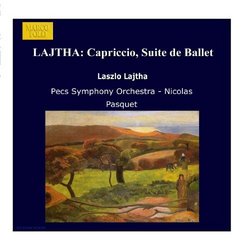Lajtha's obscurity is unwarranted, listen to this CD and be
Russ | Richmond, VA | 07/08/2006
(5 out of 5 stars)
"Laszlo Lajtha (1892-1963), along with Bartok and Kodaly, was a leading composer in twentieth century Hungary. Most people are familiar with the works or Bartok. Of those people, a certain percentage of this group is familiar with the small but distinct output of Kodaly. But, it seems the music of Lajtha is virtually unknown. This relative neglect is completely unjustified and stems from the fact that he was dismissed from the positions he held and was banned from traveling internationally after the takeover by the Communists. In general, I would say that Lajtha is more approachable than Bartok and more colorful than Kodaly.
Lajtha's music his heavily influenced by Hungarian folk material he collected from his travels within his home country. His music is brilliantly orchestrated with subtle colorings. A certain melancholy mood permeates most of his works, but his compositions are sometimes bright and festive. He composed nine symphonies, three ballets, and a substantial number of chamber works.
The Capriccio is a fourteen movement ballet composed in 1944. It is said that during its composition that Lajtha would not stop composing, even during air raids, if he "was working on a part that gave him particular delight." This is enchanting, beautiful music. The somber "Menuet et Musette" (Track 7) movement is my favorite, with Lajtha's beguiling use of shifting orchestral colors. Much of this music has an imaginative, fantastical quality. For instance, the swirling violins, harp and glockenspiel playing, along with the delicate woodwind playing heard in the "Scherzo" movement (Track 11) create a "fairytale-like" atmosphere.
It is sad that Lajtha never heard any of this delightful music performed in his lifetime. Apparently a staged performance of the ballet has yet to take place.
If you like this CD, be sure to move onto the symphonies (I would start with 5 & 6). The Lajtha CD's issued on Marco Polo seem to be disappearing from the catalogue so get them while you can. We can hope they will appear on Naxos - but no word on that yet.
In conclusion, get this CD if you enjoy vibrant, nationalistic, orchestral music of the twentieth century.
77:05"


 Track Listings (14) - Disc #1
Track Listings (14) - Disc #1